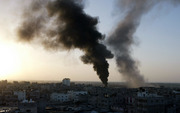 Everyone expected the Israeli government and Hamas to honour a ceasefire; at least until Barack Obama’s inauguration, to allow the new U.S president time to get his feet under the desk. Rumours had been going around that one of Obama’s first acts would be to convene an Annapolis-style Mid East conference. Not to achieve peace, but to kickstart the kind of diplomatic process the region so sorely needs.
Everyone expected the Israeli government and Hamas to honour a ceasefire; at least until Barack Obama’s inauguration, to allow the new U.S president time to get his feet under the desk. Rumours had been going around that one of Obama’s first acts would be to convene an Annapolis-style Mid East conference. Not to achieve peace, but to kickstart the kind of diplomatic process the region so sorely needs.
But Hamas’ incessant shelling of southern Israel, its cancellation of a recent truce, and the pressures of the Israeli election –- which have seen the hawkish Likudnik Benjamin Netanyahu take a lead over Tzipi Livni, the pro-peace foreign minister, with Labour’s Ehud Barak struggling for attention –- forced the Israeli government’s hand.
On Saturday, outgoing Prime Minister Ehud Olmert launched one of the largest offensives on the Gaza Strip since Israel captured the territory in 1967. Palestinian sources claim at least 271 people have been killed, 180 are believed to be part of Hamas’ security apparatus.
The Israel military has announced its intention to call up 6,500 reservists to duty – for a potential ground invasion — and the Israeli government looks set to ignore calls by the UN Security Council to show restraint. From Syria, Hamas’ top leader, Khaled Meshal, called on Palestinians to rekindle their fight against Israel and renew suicide bombings. “This is the time for a third Intifada,” he said. And Iran’s Supreme Leader Ayatollah Ali Khamenei issued a religious decree to all Muslims, ordering them to defend Palestinians against Israel’s attacks on Gaza.
In spite of the escalating rhetoric and the real risk of an Israeli ground invasion it is hard to see Israel retaking and holding on to the Gaza strip for long. First of all, the cost is prohibitive. Gaza’s 1.5 million inhabitants would become Jerusalem’s responsibility to the tune of $430,000 day. This would add up to $126 million a month. Second, the area’s reconstruction would cost a lot more. Following Israel’s last major incursion, in 2002, the UNS estimated the reconstruction costs at $70 million.
Third, by invading Gaza the IDF would become vulnerable to the kind of asymmetric attacks that Hamas excel at. Finally, and most importantly, nobody thinks Hamas will easily be defeated. Despite the poverty, insecurity and humiliation that represent everyday life in the territory, many Gazans are inclined to support the party. On my recent trip to Israel and the West Bank, I spoke to an IDF soldier who had served in Gaza. Describing Gaza as an “oversized, over-heated toilet”, with faeces lining the streets, he admitted that people were likely to support extremist parties like Hamas out of desperation if nothing else.
For these reasons, Ehud Barak, Israel’s defense minister says Israel is striving for a lesser, temporary objective – such as delivering such a blow to Hamas that the Islamic militants will halt rocket attacks. But it is unclear whether this, too, is an achievable aim.
In 2006, the Israeli government invaded Lebanon to stop Hezbollah’s rocketing of northern Israel. Though Hezbolla was weakened militarily, it gained politically from Israel’s actions and the invasion has largely been seen in retrospect as an error. A former 4* U.S general described the operation to me as “military buffoonery”.
It is hard to see how days of bombardments and incursions into Gaza will achieve anything else than a temporary diminution of Hamas, and a worsening of the humanitarian situation. The only alternative would occur if Fatah could take advantage of Hamas’ weakness and regain control in Gaza. But chances of this are slim.
The more likely scenario is that Israeli actions will continue until there is a lull in Hamas rocket attacks; IDF commandos have tried to rescue captured Israeli soldier Gilad Shalit; and Tzipi Livni and Ehud Barak feel they have achieved enough to counter Benjamin Netanyahu’s hawkish electoral rhetoric. Then Israel and Hamas will likely agree another truce, much like the one reached last June. And, as the world press moves, the seeds of the next round of violence will be sown.
To avoid an escalation of violence, U.S President-Elect Obama should announce an intention to appoint a Middle East envoy. In the meantime, it would be good if a third-party – France, Egypt or even Qatar – could help the parties reach an unofficial ceasefire agreement as soon as possible. Israel may be in the right, but that does not make its actions wise.






Comments